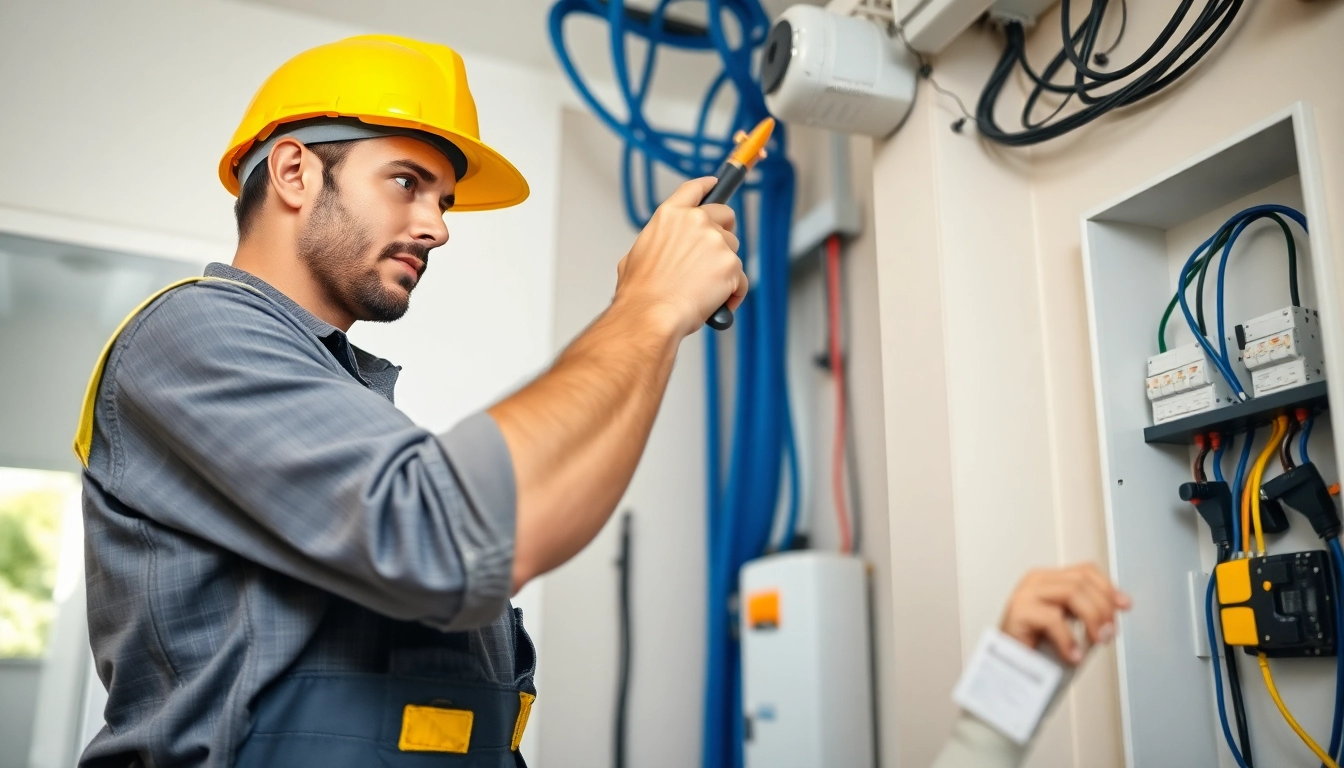
Understanding Electrical Service
What is Electrical Service?
At its core, electrical service encompasses the delivery of electrical power to homes, businesses, and other establishments. This often includes the setup and maintenance of infrastructure such as service panels, transformers, wiring, and safety devices. The electrical service also describes the interactions between the utility company and the customer, ensuring that the energy produced is safely and efficiently transmitted to where it is needed.
When discussing Electrical Service, it’s crucial to understand the components that make it up, including: service entrance, circuit breakers, load calculation, and metering. Each of these elements plays a significant role in ensuring safe and reliable power delivery.
Importance of Proper Electrical Service
A well-established electrical service is paramount for safety, efficiency, and reliability. Improper electrical services can lead to various hazards including electrical shocks, fires, or even property damage. Some key points to highlight include:
- Safety: An optimized electrical service minimizes risks associated with electrical fires and personal injuries.
- Energy efficiency: Proper electrical setups help in reducing energy consumption, leading to lower electric bills.
- Property value: A home or business with a solid electrical foundation is often more appealing to buyers and less risky for insurance companies.
- Regulatory compliance: Following national and local electrical codes is necessary to avoid fines and ensure safety standards are met.
Common Terms in Electrical Service
Familiarity with specific terminology is essential when discussing or engaging with electrical services. Here are some commonly used terms:
- Service Panel: This is the main hub for the electrical system, distributing power throughout the structure.
- Load Capacity: The maximum amount of electrical load that a system can handle safely.
- Circuit: A pathway through which electricity flows; includes a power source, wires, and light fixtures.
- Breaker: A device that interrupts the flow of electricity when an overload occurs, preventing potential hazards.
Types of Electrical Services Offered
Residential Electrical Services Overview
Residential electrical services focus on the power needs of homes and may include:
- Installation of lighting fixtures: From ambient indoor lighting to outdoor security lights.
- Wiring upgrades: Updating old wiring to meet current standards and improve safety.
- Home automation systems: Smart home systems that enhance energy management and provide convenience.
- Energy-efficient upgrades: Installation of LED fixtures or solar panels to reduce energy consumption.
Commercial Electrical Services Explained
For commercial entities, electrical services become more complex as they are tailored to higher energy demands and compliance with stricter regulations. Services offered may include:
- Load analysis: Determining energy needs based on operational demands.
- Facility wiring: Installing and maintaining wiring systems that can handle intensive energy use.
- Backup power solutions: Generators and uninterruptible power supplies (UPS) for critical operations.
- Energy audits: Comprehensive evaluations aimed at identifying energy-saving opportunities.
Emergency Electrical Services: What to Know
Electrical emergencies can occur at any time, requiring swift and professional intervention. Common scenarios include:
- Power outages: Often requiring immediate troubleshooting to restore power.
- Flickering lights: This may indicate a failing electrical panel or overloaded circuits.
- Burning smells: A potential sign of electrical shorts that could lead to fires.
It’s critical to have access to emergency electrical services to handle these situations promptly and efficiently.
Choosing the Right Electrical Service Provider
Key Qualities to Look For
Selecting an electrical service provider requires careful consideration. Key attributes to evaluate include:
- Licensing and insurance: Ensure that the contractor is licensed and carries adequate liability insurance.
- Experience: Look for a provider with extensive experience and a proven record in electrical services.
- Customer Service: A company that values customer feedback and maintains clear communication is preferable.
- References: Seek recommendations or reviews from previous clients to gauge satisfaction.
Questions to Ask Electrical Service Professionals
When consulting with potential electrical service providers, consider asking the following questions:
- What specific services do you provide?
- Can you provide a detailed written estimate?
- What is your approach to safety and compliance with regulations?
- How will you handle unexpected issues or changes during the project?
Evaluating Reviews and Recommendations
Reviews from peers and online platforms can significantly influence your decision. Look for:
- Consistency: Multiple positive reviews across various platforms strengthen a contractor’s credibility.
- Resolution of issues: Consider how the contractor responds to negative feedback, as it indicates their commitment to customer satisfaction.
- Professionalism: Feedback highlighting professionalism, punctuality, and communication can help inform your choice.
Cost Considerations for Electrical Services
Factors Impacting Electrical Service Costs
The cost of electrical services can vary widely based on numerous factors:
- Project complexity: Simple tasks (like replacing fixtures) cost less than complex installations or upgrades.
- Materials used: Quality of components can influence pricing; for example, premium wiring materials may increase upfront costs but lead to better durability and safety.
- Location: Geographic differences can affect labor rates and availability of services.
- Time of service required: Emergency or after-hours services frequently come with a premium.
Understanding Pricing Models and Estimates
Common pricing models used in electrical services include:
- Hourly rates: Charges based on the time spent on the job, typically covering labor and some overhead costs.
- Flat fees: Fixed costs for specific services, such as installations or diagnostic visits, which can help in budgeting.
- Estimates: Reputable service providers offer detailed estimates that encompass all potential costs, helping prevent surprises.
How to Budget for Electrical Service Needs
Budgeting for electrical services involves planning for both expected and unexpected expenses:
- Regular Maintenance: Allocate funds for ongoing maintenance to prevent costly repairs.
- Upgrading Equipment: Set aside money for essential upgrades based on the age of your electrical system.
- Emergency fund: Maintain a reserve for unforeseen circumstances like emergency repairs.
Ensuring Safety with Electrical Service
Common Electrical Hazards to Avoid
Knowledge of electrical safety is crucial in preventing accidents. Some common hazards include:
- Overloading circuits: Connecting too many devices to a single circuit can cause overheating.
- Improper wiring: Incorrect or outdated wiring can lead to persistent issues and hazards.
- Neglecting maintenance: Failing to inspect and maintain electrical systems can escalate risks over time.
Best Practices for Safe Electrical Service
To ensure safe electrical service, incorporate the following best practices:
- Routine inspections: Regularly check wiring, outlets, and fixtures for wear and tear.
- Use certified equipment: Always choose electrical components that meet industry standards.
- Keep water away: Electrical devices should never be used in damp environments without proper protection.
Regulations and Standards Governing Electrical Services
Electrical services are subject to numerous regulations. Familiarization with these ensures compliance and safety:
- National Electrical Code (NEC): A standard that dictates safe electrical practices in residential and commercial settings.
- Local Building Codes: Specific regulations that can vary by location, focusing on safety and quality standards.
- Occupational Safety and Health Administration (OSHA): Guidelines established to safeguard construction workers and professionals in electrical installation and repair.





